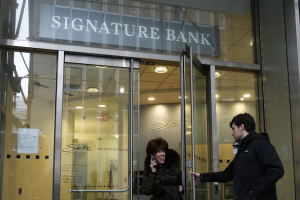Join Our Telegram channel to stay up to date on breaking news coverage
On Tuesday, two officials from the crypto-friendly Signature Bank testified before Congress about a high-profile failure that hangs over the digital assets sector and reaffirmed that the now-defunct lender didn’t need to be shut down.
The Senate Banking Committee called the hearing, which also discussed Silicon Valley Bank, which was taken into custody along with Signature in March.
Scott Shay, a co-founder of Signature and the bank’s former chairman, said the company was ready to proceed despite the $16 billion in customer withdrawals that followed SVB’s demise.
I had faith in Signature Bank’s ability to endure the economic earthquake that day, Shay added.
The bank had adequate capital. The bank was healthy.
Former President of Signature Bank Eric Howell concurred that the lender could survive, stating that it was
Well-capitalized, solvent, and had sufficient borrowing capacity to withstand these and future withdrawals.
Government Persecution of Crypto?
The phrase “Operation Choke Point 2.0” is a reference to a 2013 Department of Justice operation that targeted companies like payday lenders and online gambling businesses, which were thought to be prone to money laundering and other forms of illicit finance. In recent months, crypto influencers, executives, and media personalities have started talking about this operation. Supporters saw it as a method to purge some of the financial system’s filth and stop the spread of fraud and frauds. Its detractors said that it caught genuine firms in its net and overly regulated consumer banking practices.
Some people in the crypto world claim that Operation Choke Point 2.0 now seeks to accomplish a similar goal by denying banking services to cryptocurrency businesses and engulfing them in taxes and regulations. The DAME tax is allegedly the most recent example of this injustice
Thus, the recent government takeover of Signature Bank could be seen, in this light, to be have similar motivations behind the move.
Senator Bill Hagerty (R-TN) made reference to remarks made in March by Barney Frank, a former congressman and member of Signature’s board of directors, during the hearing. According to Frank, authorities turned off Signature in order to deliver a “very strong anti-crypto message.”
The affable former congressman Barney Frank, who now works for Signature and whose name was previously synonymous with banking regulation, said to Bloomberg that the government was trying to dissuade people from embracing cryptocurrency. “We were chosen to serve as the face of that message,” he claimed.
Despite this, this notion has been refuted by the New York Department of Financial Services (DFS), which asserts that the closure of Signature had nothing to do with cryptocurrencies.
Since a few years ago, the cryptocurrency sector has constantly demanded “regulatory clarity,” arguing that organizations like the Securities and Exchange Commission were establishing policy through arbitrary enforcement actions. Critics of crypto saw a very different situation: Although blockchain technology was a revolutionary innovation and there was regulatory clarity for cryptocurrencies, the industry disregarded rules, acted recklessly, and blamed politicians for its errors. Some proponents of cryptocurrency claimed that the Biden administration and SEC Chairman Gary Gensler, rather than Bankman-Fried and his accused cohort’s criminal behavior, were to blame for the FTX collapse. In their view, Gensler’s failure to look into FTX sooner was Gensler’s fault, but it was also the administration’s fault for its failure to provide regulatory clarity, which led businesses like FTX to relocate overseas, where they could not be adequately looked into by organizations like the SEC.
Reasons unclear
The bankruptcies of Signature and SVB, two of the biggest bank failures in American history, put the stability of the country’s financial system to the test. A flood of withdrawals rocked both banks, fatally crystallizing losses on bond holdings for SVB, although the reason for Signature’s closure is still unclear.
Scott Shay declined to comment when Hagerty questioned him about if the closure of Signature had anything to do with the bank’s exposure to cryptocurrencies, saying he “can’t speak for the regulators and their decision-making process.”
After regulators took control of the crypto-friendly institution, parts of Signature Bank were sold to Flagstar Bank, but the sale excluded deposits made by crypto customers or Signature’s Signet—the platform that linked traditional banking to cryptocurrencies.
Only a few days after Silvergate Bank, another cryptocurrency-friendly lender, voluntarily decided to wind down operations, Signature collapsed. Financial institutions engaged in the cryptocurrency industry also made extensive use of SEN, Silvergate’s quick settlement technology.
Blaming the crypto industry
Senator Cynthia Lummis (R-WY) charged co-founder Scott Shay with shifting responsibility for Signature’s failure from its management strategies to cryptocurrency companies. She claimed that the failure of Signature Bank was caused by digital assets because they were cited ten times in her testimony. “It appears that a lot of the blame has been shifted to those specific depositors who deal in digital assets.”
Lummis argued that cryptocurrency wasn’t at blame and referenced a DFS study that revealed outflows among cryptocurrency consumers were proportional to other clients that withdrew money from Signature. She added that the bank had never purchased or sold cryptocurrency.
By the time the hearing on Tuesday came to an end, the two former Signature officials had not made any definite statements regarding the reasons the bank was ultimately closed. Whether crypto contributed to Signature’s demise remained an open question, at least in the eyes of some of individuals who were among the closest to it.
As this story unfolds, we will provide more details as they emerge on the real reasons behind the collapse and government takeover.
Related
- U.S. Congress to Address SEC Oversight and Legislation Regarding Stablecoins
- Coinbase and the SEC
- Operation Choke Point 2.0: US goes after crypto amid confusion and uncertainty
Best Wallet - Diversify Your Crypto Portfolio
- Easy to Use, Feature-Driven Crypto Wallet
- Get Early Access to Upcoming Token ICOs
- Multi-Chain, Multi-Wallet, Non-Custodial
- Now On App Store, Google Play
- Stake To Earn Native Token $BEST
- 250,000+ Monthly Active Users
Join Our Telegram channel to stay up to date on breaking news coverage


